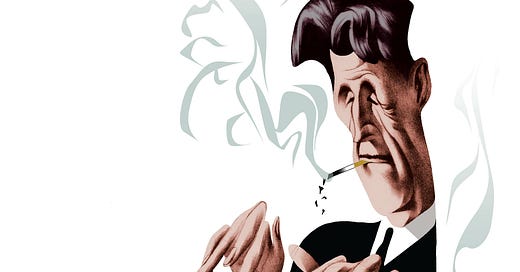There is a great deal of good bad poetry in English, all of it, I should say, subsequent to 1790. Examples of good bad poems – I am deliberately choosing diverse ones – are ‘The Bridge of Sighs’, ‘When all the world is young, lad’, ‘The Charge of the Light Brigade’, Bret Harte’s ‘Dickens in Camp’, ‘The Burial of Sir John Moore’, ‘Jenny Kissed Me’, ‘Keith of Ravelston’, ‘Casabianca’. All of these reek of sentimentality, and yet – not these particular poems, perhaps, but poems of this kind, are capable of giving true pleasure to people who can see clearly what is wrong with them. One could fill a fair-sized anthology with good bad poems, if it were not for the significant fact that good bad poetry is usually too well known to be worth reprinting.
It is no use pretending that in an age like our own, ‘good’ poetry can have any genuine popularity. It is, and must be, the cult of a very few people, the least tolerated of the arts. Perhaps that statement needs a certain amount of qualification. True poetry can sometimes be acceptable to the mass of the people when it disguises itself as something else. One can see an example of this in the folk-poetry that England still possesses, certain nursery rhymes and mnemonic rhymes, for instance, and the songs that soldiers make up, including the words that go to some of the bugle-calls. But in general ours is a civilization in which the very word ‘poetry’ evokes a hostile snigger or, at best, the sort of frozen disgust that most people feel when they hear the word ‘God’. If you are good at playing the concertina you could probably go into the nearest public bar and get yourself an appreciative audience within five minutes. But what would be the attitude of that same audience if you suggested reading them Shakespeare’s sonnets, for instance? Good bad poetry, however, can get across to the most unpromising audiences if the right atmosphere has been worked up beforehand. Some months back Churchill produced a great effect by quoting Clough’s ‘Endeavour’ in one of his broadcast speeches. I listened to this speech among people who could certainly not be accused of caring for poetry, and I am convinced that the lapse into verse impressed them and did not embarrass them. But not even Churchill could have got away with it if he had quoted anything much better than this.
This is an extract from a longer essay, 'Rudyard Kipling’, published in Horizon, September 1941. All rights reserved - this material remains under copyright and may not be distributed or reused in any way or broadcast without permission from the Orwell Estate.





An excerpt from the full essay that even today still rings true, "All left-wing parties in the highly industrialized countries are at bottom a sham, because they make it their business to fight against something which they do not really wish to destroy. They have internationalist aims, and at the same time they struggle to keep up a standard of life with which those aims are incompatible. We all live by robbing Asiatic coolies, and those of us who are ‘enlightened’ all maintain that those coolies ought to be set free; but our standard of living, and hence our ‘enlightenment’, demands that the robbery shall continue."
Ole GO was never afraid to send a shot, or two, across the bow! This also reminded me of Nietzsche's poetry in "The Gay Science."